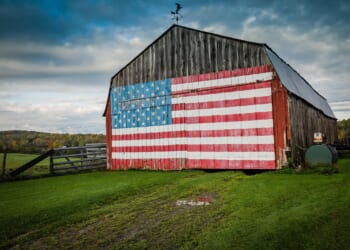There’s a class war brewing on the streets of Malton. Since 2012, the picturesque market town has been branded as the “food capital of Yorkshire”. On one street, there’s a traditional butcher’s selling beautifully dressed cuts of meat. Across the market square, a greengrocer’s overflowing with produce. In a single courtyard, you’ll find a gin distillery, a coffee roastery, a master patissier and a gelato bar all nestled together. The Food Lovers Festival alone attracts more than 30,000 people.
Yet next year, it looks like there won’t be a Food Lovers Festival in Malton. Nor will the town continue to host its monthly specialist food market. The annual Malton 10k — a running event with gourmet snack stations — is also off. Most gallingly of all, there will be no Christmas market in Malton this December, depriving the town’s traders of one of their most important weekends of the year. And all this was announced when traders were already deep into preparations, leaving them little time to make alternative arrangements.
The decision to cancel (almost) all food-related events in the food capital of Yorkshire comes down to one entity: the Fitzwilliam Estate, which owns more than 60% of Malton’s commercial property. The Estate is controlled by Tom Naylor-Leyland. Malton has been in his family since 1713, although it is only a tiny portion of a vast portfolio which also includes the 15,000-acre Wentworth estate, Milton Hall, in Cambridgeshire, and the 17th-century Nantclwyd Hall in Denbighshire. Nonetheless, until recently, it was a portion in which he took a special interest. It was Naylor-Leyland who decided Malton should become a foodie destination; now, apparently, he has decided that should change.
Back in the 2000s, Malton was a typical small British town, fading away as its younger population constantly flowed away to where the jobs were. But Naylor-Leyland saw potential: Yorkshire food was celebrated elsewhere in the country, so why not capitalise on the place it comes from? The estate invested heavily in food businesses, and many producers relocated to Malton to take advantage of the thriving scene. Now those same producers have been hung out to dry by the local aristocrat. The loss of the festival is a particular blow, one local trader (who asked to remain anonymous because he’s a tenant of the estate) tells me: not only did this account for a significant proportion of his takings, but it also brought new people to the town.
“I don’t think this will immediately put people out of business, or if it does, that business was in trouble anyway,” he says. “But what I can’t account for is the slow grind of people not coming to Malton. Without the festival, Malton will end up like any other Yorkshire town.”
“Without the festival, Malton will end up like any other Yorkshire town.”
For the producers who’ve been drawn in over the last 13 years by Naylor-Leyland’s promises and are now locked into leases, it’s a betrayal, and one made worse by the way the news was delivered: “All local businesses found out through the press and local gossip groups, and there’s no clarity or sense. We still don’t know for sure what’s happening.”
In a statement, the Fitzwilliam Estate (which did not respond to a request for comment for this article) claimed it had done its best to contact all affected businesses, and blamed the cancellation on “rising operating costs”, despite the fact that the last filed accounts show an increase in net assets from 2023 to 2024. But confusingly, the Estate went on to imply that the move away from markets was strategic: “Whilst the events bring welcome footfall and promotion for the town, this is often felt at peaks during the year, as opposed to all-year-round. We are dedicated to making Malton a go-to destination and thriving rural community where businesses can flourish year-round.”
This is, bluntly, nonsensical. The food industry is highly seasonal, and particularly for luxury goods, the lead-in to Christmas is where the profits come from. Producers rely on the feasts to get them through the leaner times. The idea of consumers thoughtfully spreading their posh food budget across the entire year, rather than blowing through it all during Advent, is a bizarre fantasy. The Estate cannot possibly be serious about this.
But the Estate doesn’t need to be serious. Malton is its possession, and it can do as it pleases. Naylor-Leyland has cheerfully played the part of the enthusiastic dilettante, saying in one interview: “I never studied accountancy — I probably should have. But if you look at it only that way, you would struggle. You have to connect with people and bring them along with you.” It’s just bad luck for everyone who “connected” with him up till now that he’s decided not to “bring them along” any further.
Besides, Naylor-Leyland appears to have other priorities these days. Though his Instagram is @tominmalton, he hasn’t posted about the town since May this year. Instead, his attention is focused on a very different enterprise: his wife Alice Naylor-Leyland’s “tablescaping” and interiors company, Mrs. Alice, which recently launched in the US. (Tom Naylor-Leyland is the second-biggest shareholder in Mrs. Alice after his wife, and a director of the company; in her own social media, she likes to refer to him as “Mr Alice”.)
On Alice Naylor-Leyland’s Instagram, Malton is never mentioned at all. The couple and their children live in a big pile in Cambridgeshire, and own a flat in Chelsea. Alice Naylor-Leyland has also alluded in interviews to a family home in Wales (“stunning”) and her father’s house in the Bahamas (“heaven on earth!”), but apparently the food capital of Yorkshire has never captured her imagination. In fact, she doesn’t seem very interested in food at all: she’s much more enthused by all the non-edible things you can lay out for dinner guests.
Tablescaping, according to Alice Naylor-Leyland, is an “art”. “For my table decor, I am really inspired by the seasons,” she has said. “I use whatever I can find in my garden and then layer with complementary colors and textures.” Luckily for mere plebs who don’t have access to the flora of multiple estates, there is another way to tablescape: buy a £200 box of tat from Mrs. Alice to ensure your guests know you’ve made an effort. Is a dinner party even a dinner party without a Joy of Autumn Decoration set featuring, among other things, three kinds of velvet mushroom and a set of “owlettes”? And while you’re stocking up, don’t forget to pick up Mr. & Mrs. Fall Squirrel (£28) and Tomasina the Turkey (£32 the pair) to complete your look.
What’s most notable here isn’t the fact that adult women are being convinced to buy what are, effectively, overpriced toys you can’t even play with; it’s that the marketing is all US-centric. Brits don’t have “fall”, we have autumn. But then Brits, on the whole, are resistant to this kind of flannel from the upper classes: we know that someone with a houseful of heirlooms isn’t really “inspired” by a polymer pumpkin.
It’s the Americans who are suckers for this stuff: according to a recent interview in The Telegraph, the US accounts for 65% of Mrs Alice’s sales. In the states, continued the breathless copy, “she’s regarded as a Martha Stewart for the Instagram age”. It’s silly to politicise a set of beaded velvet mushrooms (£66), but Mrs. Alice is surely just the ticket for the MAGA elite and those who aspire to join it: conspicuous consumption with the taste stripped out, hinting at a fantasy of elevated WASP origins.
Alongside the article, there was a picture of Alice Naylor-Leyland dressed in a lavish green ballgown standing next to a table heaving with coordinated knick-knacks, in the grounds of Bath’s Prior Park. “I’m unashamedly into the frills and the fun of dressing up,” she trilled to the journalist. “But then, you’ve got one shot at this life. Why hold back?” It’s an image of purest Marie Antoinette: the noblewoman playing at pastoralism. Meanwhile her family estate’s subjects are left facing an uncertain future thanks to the Fitzwilliam Estate’s act of caprice.
It is bizarre to think that in modern Britain, practically a whole town can be handed down as an inheritance, then reshaped according to the landowner’s whim — and abruptly palmed off when those whims change. But under the skin of modernity, this remains a deeply feudal nation, and Malton is paying the price of that truth. The town has been treated like a table to be “scaped”: tinkered with until it made a pleasing showcase for its owner’s wealth, then bundled back into its box. “The town has been treated as a plaything of the rich and landed gentry,” says the trader I speak to. “He’s done with us, and we need to work out how to pick up the pieces.”
Mrs. Alice sells Americans the dream of gracious British country living, while her husband guts the business model that for 13 years has enabled actual country-dwellers to make a living. It is cruel, but it should not be surprising. Tom Naylor-Leyland was able to present himself as a caring “steward” to Malton, when he should always have properly been described as its owner. Strip away the gentle euphemisms from Britain’s unequal society, and the injustice of it all becomes as crassly obvious as a gold glitter pheasant in the middle of your table.

















